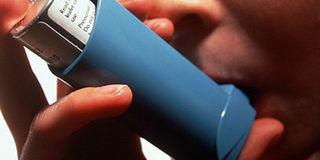59% of asthma cases in children not diagnosed, says report

A new study conducted by the Makerere University Lung Institute indicates that 59 percent of school-going children with severe symptoms of asthma, are not diagnosed.
What you need to know:
- Asthma is a health condition in which a person’s airways become inflamed, narrow, swollen and produce extra mucus, making it difficult to breathe. It has been identified as the most common non-communicable disease (NCD) in children and adolescents.
A new study conducted by the Makerere University Lung Institute indicates that 59 percent of school-going children with severe symptoms of asthma, are not diagnosed.
Asthma is a health condition in which a person’s airways become inflamed, narrow, swollen and produce extra mucus, making it difficult to breathe. It has been identified as the most common non-communicable disease (NCD) in children and adolescents.
According to the Achieving Control of Asthma in Children in Africa (ACACIA) research conducted in 10 randomly selected secondary schools in the districts of Mukono, Wakiso, and Kampala, during which a total of 895 children between the ages of 12 and16 were screened, 177 children had asthma symptoms. This meant that two in every 10 students had asthma.
Presenting the ACACIA findings during a meeting in Kampala on Wednesday, Ms Rebecca Nantanda, the lead research scientist for the project, said: “Of the 108 children screened with severe asthma symptoms, 59 percent had no diagnosis”.
She cited symptoms of severe asthma cases including dry cough, making whoosh sounds while asleep and shortness of breath.
The study, which was also conducted in five other countries: Zimbabwe, Malawi, South Africa, Nigeria and Ghana, was intended to improve the health of children with asthma in Africa. It was co-funded by the UK Research and Innovation.
While speaking during the release of the study findings for Uganda, Dr Frank Mugabe, the principal medical officer for NCDs at the Ministry of Health, said as of September, the Health Management Information System (HMIS) had registered more than106,000 cases of asthma, a figure he said could be higher.
He appealed to government and civil society actors to push for a national policy on chronic respiratory diseases, whose medicines don’t come cheap. “Other diseases have policies in place but there is no policy on chronic respiratory diseases. Without a policy, government continues to avoid responsibility,” said Dr Mugabe.
He revealed that the Health ministry would soon roll-out refresher training for health workers on how best to diagnose asthma cases given the increasing levels of pollution, especially in urban areas.
“So what we need are resources to go out and train these health workers. Refresh them. We believe that they will acquire some knowledge about asthma,” Dr Mugabe said.
He noted that most health workers in Uganda also need to be acquainted with the recent more effective asthma medicines and treatment forms.





